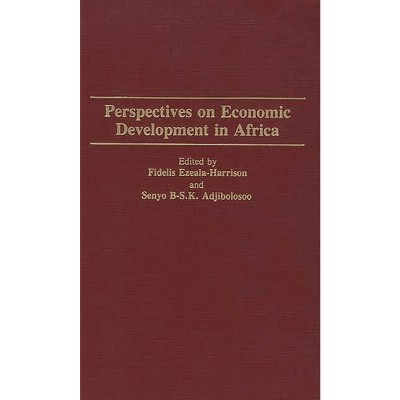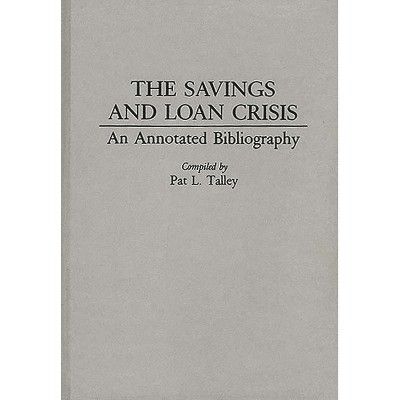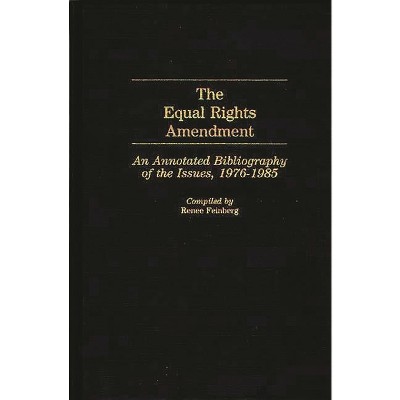Sponsored

Human Rights in Africa - (Bibliographies and Indexes in Economics and Economic History) by Chris Maina Peter (Hardcover)
In Stock
Sponsored
About this item
Highlights
- Published under the auspices of the Consortium on Human Rights Development, this book presents a comparative analysis of two legal instruments: one national--the New Tanzanian Bill of Rights--and the other regional--The African Charter on Human Rights and People's Rights.
- About the Author: CHRIS MAINA PETER is a Lecturer in Law at the University of Dar es Salaam, Tanzania.
- 153 Pages
- Political Science, Civil Rights
- Series Name: Bibliographies and Indexes in Economics and Economic History
Description
About the Book
Published under the auspices of the Consortium on Human Rights Development, this book presents a comparative analysis of two legal instruments: one national--the New Tanzanian Bill of Rights--and the other regional--The African Charter on Human Rights and People's Rights. Both are important for the purposes of protection and promotion of human rights. Human Rights in Africa records the movement towards anarchy and dictatorship in Africa which contributed tremendously to the new thinking and re-thinking about the need to respect human dignity in Africa. In this book, the author poignantly illustrates the national disregard of human rights. Taking the case of Tanzania, Peter shows various incidents of violation of human rights. He then cites examples of violations at different levels in other African and Third World countries.
Part One of the book presents an historical examination of the Tanzanian Bill of Rights and the African Charter on Human and People's Rights. Part Two offers a thorough comparison of these two legal instruments. Part Three covers the entire scope of people's rights and Parts Four and Five take a look at the enforcement mechanism of these legal instruments. Part Six presents the author's conclusions and summary statements. Both the New Tanzanian Bill of Rights and the African Charter on Human and People's Rights can be found in their entirety in the Appendix. This book makes informative reading to anyone interested in international law, African history, human rights and related subjects.
Book Synopsis
Published under the auspices of the Consortium on Human Rights Development, this book presents a comparative analysis of two legal instruments: one national--the New Tanzanian Bill of Rights--and the other regional--The African Charter on Human Rights and People's Rights. Both are important for the purposes of protection and promotion of human rights. Human Rights in Africa records the movement towards anarchy and dictatorship in Africa which contributed tremendously to the new thinking and re-thinking about the need to respect human dignity in Africa. In this book, the author poignantly illustrates the national disregard of human rights. Taking the case of Tanzania, Peter shows various incidents of violation of human rights. He then cites examples of violations at different levels in other African and Third World countries.
Part One of the book presents an historical examination of the Tanzanian Bill of Rights and the African Charter on Human and People's Rights. Part Two offers a thorough comparison of these two legal instruments. Part Three covers the entire scope of people's rights and Parts Four and Five take a look at the enforcement mechanism of these legal instruments. Part Six presents the author's conclusions and summary statements. Both the New Tanzanian Bill of Rights and the African Charter on Human and People's Rights can be found in their entirety in the Appendix. This book makes informative reading to anyone interested in international law, African history, human rights and related subjects.Review Quotes
?This modest book--61 pages of text, 75 pages of footnotes, appendixes and bibliography--undertakes a major task. In 1988, the Government of the United Republic of Tanzania appended a bill of rights to its constitution. Peter (law, University of Dar-es-Salaam) utilizes the African Charter of Human and People's rights (the "Banjul Charter") as a standard against which to assess the new Tanzanian safeguards. That the author did not examine and contrast bills of rights from other former British colonies is somewhat surprising; he comments that such legislation arose largely from the desire of the departing colonial power to protect the security and property of British citizens and subjects, and (by inference) did not appropriately reflect indigenous concerns. Peter criticizes the drafting and limited enforcement mechanisms of the Tanzanian bill of rights in a clear, concise manner, after comparing rights and duties of individuals and of peoples in it and in the Banjul Charter. This, the tenth volume in a series edited by the noted Africanist George W. Sheperd, Jr., should be followed in a few years by an analysis of the case law that will develop under the Tanzanian bill of rights; the current book is a prolegomenon rather than a definitive study. Graduate level.?-Choice
"This modest book--61 pages of text, 75 pages of footnotes, appendixes and bibliography--undertakes a major task. In 1988, the Government of the United Republic of Tanzania appended a bill of rights to its constitution. Peter (law, University of Dar-es-Salaam) utilizes the African Charter of Human and People's rights (the "Banjul Charter") as a standard against which to assess the new Tanzanian safeguards. That the author did not examine and contrast bills of rights from other former British colonies is somewhat surprising; he comments that such legislation arose largely from the desire of the departing colonial power to protect the security and property of British citizens and subjects, and (by inference) did not appropriately reflect indigenous concerns. Peter criticizes the drafting and limited enforcement mechanisms of the Tanzanian bill of rights in a clear, concise manner, after comparing rights and duties of individuals and of peoples in it and in the Banjul Charter. This, the tenth volume in a series edited by the noted Africanist George W. Sheperd, Jr., should be followed in a few years by an analysis of the case law that will develop under the Tanzanian bill of rights; the current book is a prolegomenon rather than a definitive study. Graduate level."-Choice
About the Author
CHRIS MAINA PETER is a Lecturer in Law at the University of Dar es Salaam, Tanzania. He is also the author of Choosing Sides: A Polemical Approach to Three Schools of Jurisprudence.Shipping details
Return details
Frequently bought together
Trending Non-Fiction

















